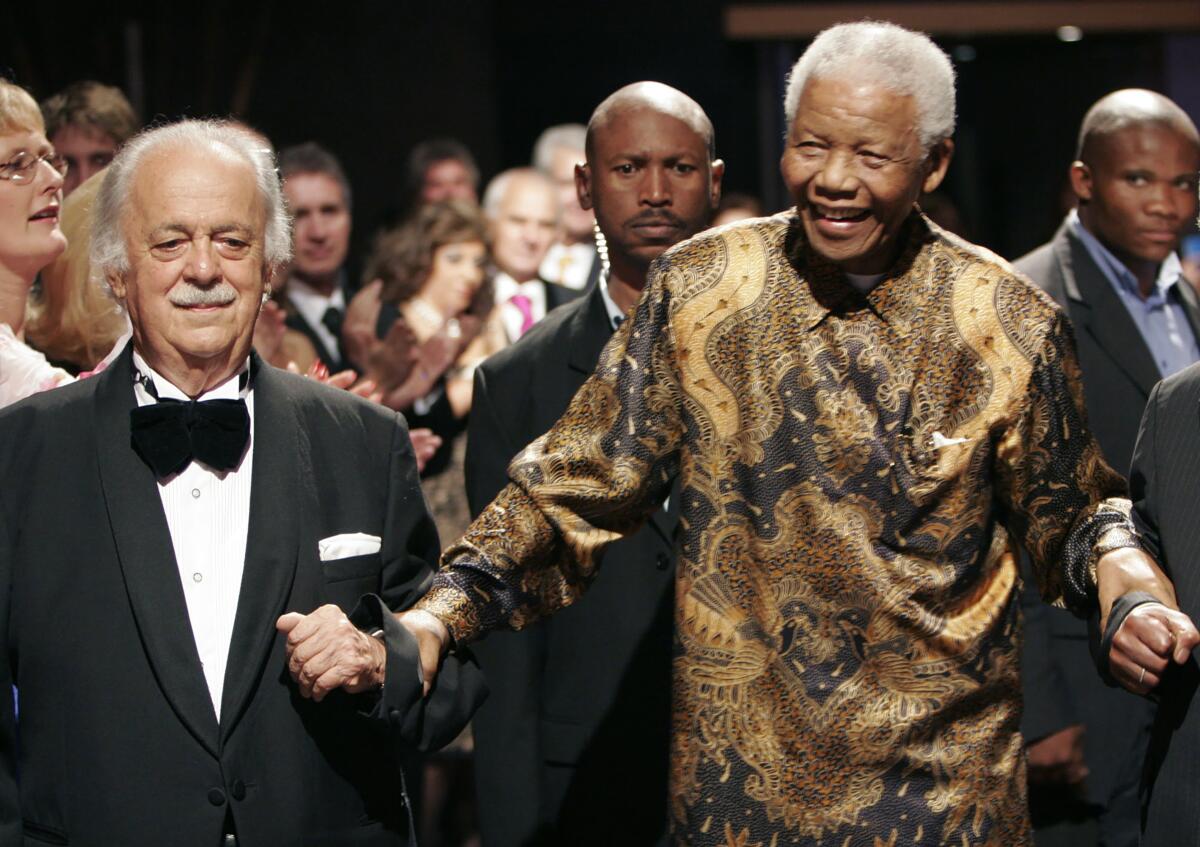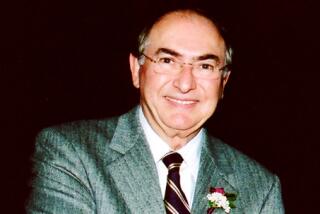George Bizos, renowned anti-apartheid activist and Nelson Mandela’s attorney, dies

- Share via
Anti-apartheid activist and Nelson Mandela’s personal lawyer George Bizos, who fled the Nazis before taking on racism in South Africa, has died at his home in Johannesburg, his family said. He was 92.
Bizos died of natural causes, his family said Wednesday.
Bizos, who came to South Africa as a 13-year-old fleeing the Nazi occupation of Greece, played a key role in the legal fight to end apartheid, the racist system used to oppress South Africa’s Black majority for decades.
“This is a very sad moment for our country,” President Cyril Ramaphosa said. “He contributed immensely, immensely to the attainment of our democracy” and was one of the architects of the post-apartheid constitution. “We dip our heads in honor.”
The soft-spoken but determined Bizos represented Mandela starting with his treason trial in 1964 up until the former South African president’s death in 2013. Bizos is credited with getting Mandela to add the words “if needs be” to his speech from the dock in which he said he was prepared to die for his ideals. The addition was seen as an escape clause, avoiding any impression that Mandela was goading the court to impose the death penalty.
“Another giant of South African history and of global struggles for justice has fallen,” the Nelson Mandela Foundation said. It described the friendship between Bizos and Mandela as legendary, and it recalled Mandela’s praise: “I don’t think words can sufficiently express our indebtedness to men and women like George Bizos.”
The two met as law students. During Mandela’s years in prison, Bizos helped to look after Mandela’s family, and he played a key role in negotiations for Mandela’s release in 1990. “In the last years of Mandela’s life, they were often to be found together, just catching up, sharing memories,” the foundation said.
Bizos represented a wide range of people who defied apartheid, including the families of slain activists such as Steve Biko, and helped write the laws for the newly democratic country after apartheid ended with Mandela’s presidency in 1994.
The Southern Africa Litigation Center described Bizos in a statement as “a shining light during the dark days of apartheid and beyond.”
Bizos remained active in human rights work in South Africa well into his 80s with the Legal Resources Center. In 2014, he questioned witnesses during an inquiry into the shooting deaths of several dozen protesters by police during a strike at Lonmin’s Marikana platinum mine in 2012.
Bizos considered himself Greek and South African to the core. During the struggle against apartheid, he said he drew on his schooling in Greece about democracy and freedom.
He arrived in South Africa as a World War II refugee in 1941. He attended the University of the Witwatersrand, where he was involved in leftist student politics.
As a young lawyer in 1956, he helped defend Mandela and 155 other South Africans of all races who supported the Freedom Charter calling for a nonracial democracy and a socialist-based economy. All were acquitted.
Bizos later was part of the team credited with saving Mandela and others from the death penalty in the famous Rivonia Trial, at which Mandela and seven others were convicted of sabotage and sentenced to life in prison.
Bizos’ efforts defending ordinary South Africans who ran up against apartheid laws brought home the tragedy of the racist system. In his 2007 memoir, “Odyssey to Freedom,” he wrote of teachers and parents trying to supplement the inferior education the white government designed for Black children. Their weekend and afternoon classes, called “cultural clubs,” were declared illegal.
Despite setbacks in court, Bizos was renowned for standing up to police and other officials who used brutal means to enforce apartheid.
“No South African lawyer did more to challenge the abuse of power by the security forces under apartheid,” Arthur Chaskalson, himself a respected anti-apartheid lawyer, wrote in 1998.
Bizos wrote in his memoir of the rumor that he was the model for Marlon Brando’s portrayal of a tough attorney battling the apartheid state in the 1989 film version of Andre Brink’s “A Dry White Season.” Bizos said he was consulted by the filmmakers on the script.
He saw the film’s premiere in a New York theater full of exiled anti-apartheid activists. There were cheers when the character played by Brando revealed in a dramatic courtroom scene that a witness had been beaten by police.
Mandela, who called Bizos “a man who combined a sympathetic nature with an incisive mind,” trusted him not only to represent him in court but later to also carry messages from African National Congress leaders imprisoned on Robben Island to their colleagues in exile.
After Mandela’s release, Bizos lent his legal expertise to negotiations that led to South Africa’s first all-race elections in 1994, which made Mandela the country’s first Black president.
After apartheid, Bizos was appointed to a committee that chose judges, and worked to ensure the South African bench was racially representative. He also helped argue successfully for the abolition of the death penalty.
In neighboring Zimbabwe in 2004, he defended opposition activist Morgan Tsvangirai, who was accused of treason in a case stemming from an alleged plot to assassinate that country’s longtime, increasingly autocratic President Robert Mugabe. Tsvangirai was acquitted of the charge, which carries the death penalty.
Bizos wrote in his memoir of learning, by studying American history, about the importance of protecting freedoms once they are gained.
“The lofty principles enunciated in a constitution or a bill of rights are no guarantee that these principles will be enforced or respected,” he said. “Much work and courage is needed to ensure they are maintained despite an ever-changing history.”
Bizos is survived by three sons and seven grandchildren.
More to Read
Start your day right
Sign up for Essential California for the L.A. Times biggest news, features and recommendations in your inbox six days a week.
You may occasionally receive promotional content from the Los Angeles Times.






